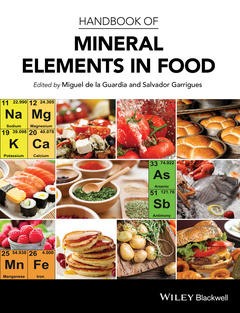Handbook of Mineral Elements in Food
Auteurs : de la Guardia Miguel, Garrigues Salvador

Mineral elements are found in foods and drink of all different types, from drinking water through to mothers? milk. The search for mineral elements has shown that many trace and ultratrace-level elements presented in food are required for a healthy life. By identifying and analysing these elements, it is possible to evaluate them for their specific health-giving properties, and conversely, to isolate their less desirable properties with a view to reducing or removing them altogether from some foods. The analysis of mineral elements requires a number of different techniques ? some methods may be suitable for one food type yet completely unsuited to another.
The Handbook of Mineral Elements in Food is the first book to bring together the analytical techniques, the regulatory and legislative framework, and the widest possible range of food types into one comprehensive handbook for food scientists and technologists. Much of the book is based on the authors? own data, most of which is previously unpublished, making the Handbook of Mineral Elements in Food a vital and up-to-the-minute reference for food scientists in industry and academia alike. Analytical chemists, nutritionists and food policy makers will also find it an invaluable resource.
Showcasing contributions from international researchers, and constituting a major resource for our future understanding of the topic, the Handbook of Mineral Elements in Food is an essential reference and should be found wherever food science and technology are researched and taught.
List of Contributors
Preface
Chapter 1 The importance of minerals in the human diet
Chapter 2 Dietary Intake of minerals
Chapter 3 Bioavailability of minerals in foods
Chapter 4 Human risk
Chapter 5 The oligoelements
Chapter 6 The toxic elements
Chapter 7 Geographical variation of land mineral composition
Chapter 8 Variation of food mineral content during industrial and culinary processing
Chapter 9 Speciation
Chapter 10 Atomic Absorption Spectrometry
Chapter 11 Elemental composition analysis of food by FAES and ICP-OES
Chapter 12 ICP-MS
Chapter 13 Application of electrochemical techniques
Chapter 14 X-ray
Chapter 15 Vibrational spectroscopy
Chapter 16 Ion chromatography
Chapter 17 Neutron Activation Analysis
Chapter 18 Speciation
Chapter 19 Drinking water
Chapter 20 Elemental composition in grapes and wine role
Chapter 21 Vegetables and fruits
Chapter 22 Cereals and pulses
Chapter 23 Bread and bakery products
Chapter 24 Edible fats and oils
Chapter 25 Elemental Composition of Sugar and Honey
Chapter 26 Meat
Chapter 27 Fish and seafood
Chapter 28 Milk and dairy products
Chapter 29 Mineral content of eggs
Chapter 30 Mineral content of seasonings, salt and vinegar
Chapter 31 Other foods of plant origin
Chapter 32 Baby foods
Chapter 33 Human milk
Index
Miguel de la Guardia is, since 1991, Professor of Analytical Chemistry at the University of Valencia (Spain), having published numerous papers in the area of Analytical Chemistry related to sample preparation, automation, atomic and molecular spectroscopy and chromatography.
Salvador Garrigues, is Professor of Analytical Chemistry at the University of Valencia (Spain) since 2006, being developed his research about sample preparation and, mainly, in the field of vibrational spectroscopy applied to the quantitative analysis, combined with automation and the use of chemometrics.
Their research group has contributed to the development of Green Analytical Chemistry and participated in different research projects focused on food characterization and food safety, also for authentication of Protected Designation of Origin (PDO) foods.
Date de parution : 05-2015
Ouvrage de 792 p.
19.6x25.2 cm
Thèmes de Handbook of Mineral Elements in Food :
Mots-clés :
mineral elements; human health; nutrition; absorption; food processing; biochemistry


